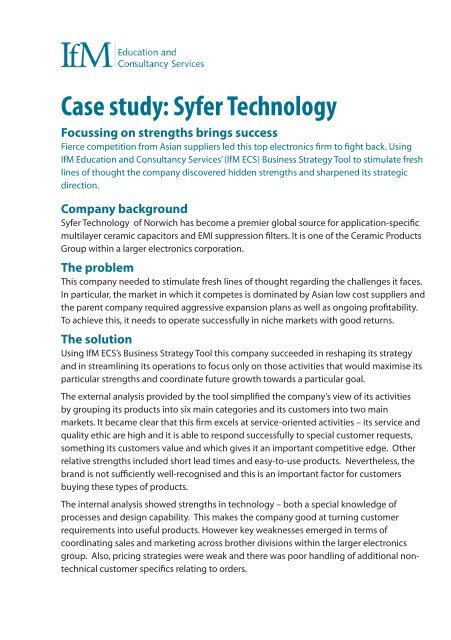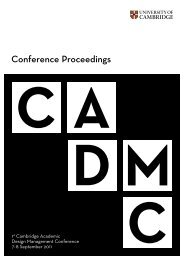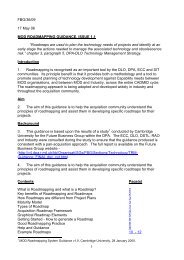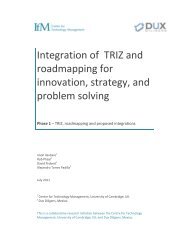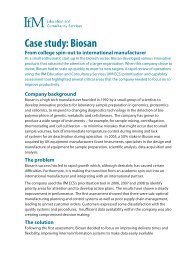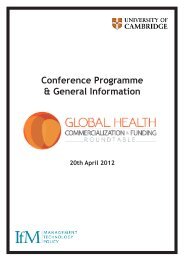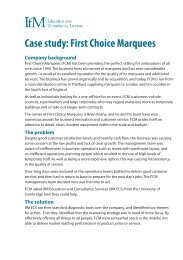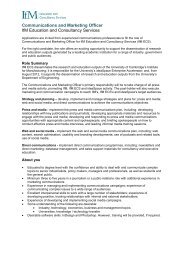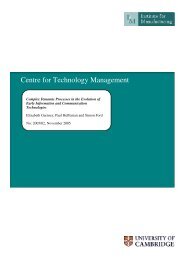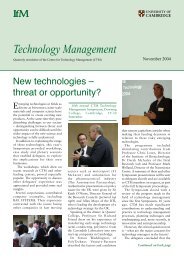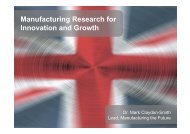Case study: Syfer Technology - Institute for Manufacturing
Case study: Syfer Technology - Institute for Manufacturing
Case study: Syfer Technology - Institute for Manufacturing
You also want an ePaper? Increase the reach of your titles
YUMPU automatically turns print PDFs into web optimized ePapers that Google loves.
<strong>Case</strong> <strong>study</strong>: <strong>Syfer</strong> <strong>Technology</strong><br />
Focussing on strengths brings success<br />
Fierce competition from Asian suppliers led this top electronics firm to fight back. Using<br />
IfM Education and Consultancy Services’ (IfM ECS) Business Strategy Tool to stimulate fresh<br />
lines of thought the company discovered hidden strengths and sharpened its strategic<br />
direction.<br />
Company background<br />
<strong>Syfer</strong> <strong>Technology</strong> of Norwich has become a premier global source <strong>for</strong> application-specific<br />
multilayer ceramic capacitors and EMI suppression filters. It is one of the Ceramic Products<br />
Group within a larger electronics corporation.<br />
The problem<br />
This company needed to stimulate fresh lines of thought regarding the challenges it faces.<br />
In particular, the market in which it competes is dominated by Asian low cost suppliers and<br />
the parent company required aggressive expansion plans as well as ongoing profitability.<br />
To achieve this, it needs to operate successfully in niche markets with good returns.<br />
The solution<br />
Using IfM ECS’s Business Strategy Tool this company succeeded in reshaping its strategy<br />
and in streamlining its operations to focus only on those activities that would maximise its<br />
particular strengths and coordinate future growth towards a particular goal.<br />
The external analysis provided by the tool simplified the company’s view of its activities<br />
by grouping its products into six main categories and its customers into two main<br />
markets. It became clear that this firm excels at service-oriented activities – its service and<br />
quality ethic are high and it is able to respond successfully to special customer requests,<br />
something its customers value and which gives it an important competitive edge. Other<br />
relative strengths included short lead times and easy-to-use products. Nevertheless, the<br />
brand is not sufficiently well-recognised and this is an important factor <strong>for</strong> customers<br />
buying these types of products.<br />
The internal analysis showed strengths in technology – both a special knowledge of<br />
processes and design capability. This makes the company good at turning customer<br />
requirements into useful products. However key weaknesses emerged in terms of<br />
coordinating sales and marketing across brother divisions within the larger electronics<br />
group. Also, pricing strategies were weak and there was poor handling of additional nontechnical<br />
customer specifics relating to orders.
Looking at the internal and external analyses in the context of the Operating Principles<br />
Model, the company concluded that it is not possible to excel at innovation, efficiency and<br />
service simultaneously. This means that one of its major product groups, which is high<br />
volume and should be low cost to compete, does not use its novel technical expertise<br />
and instead highlights the company’s weaknesses. The outcome was a decision to reduce<br />
activity in this area, to focus primarily on service (with a secondary strength in innovation).<br />
All the other product groups match this profile.<br />
The Business Strategy Tool<br />
IfM ECS’s Business Strategy Tool is practical, straight<strong>for</strong>ward and efficient, making strategy<br />
<strong>for</strong>mulation accessible to all small and medium-sized manufacturers. The tool consists of<br />
an initial data collection phase, followed by four facilitated workshops attended by the<br />
management team. It allows companies to explore and develop a strategy in response to<br />
the constantly changing environment in which they operate.<br />
An expert facilitator gathers the necessary data to ensure results will be rigorous and<br />
specific. The first step is an external analysis of the competitive market environment.<br />
Second, the firm undertakes an internal analysis of its capabilities and per<strong>for</strong>mance.<br />
Using these analyses, a set of possible strategic choices is developed. Finally, the process<br />
culminates in detailed action planning to map out the practical steps required <strong>for</strong><br />
the strategy. The process allows <strong>for</strong> consensus on the agreed strategy and a sense of<br />
ownership by those who will need to implement it.<br />
Benefits<br />
Having completed the Business Strategy Workshops, <strong>Syfer</strong> MD Howard Ingleson reported<br />
several benefits. As well as the improved focus and clearer strategic direction <strong>for</strong> the<br />
company, the process proved helpful in unifying the management group, some of whom<br />
were new to their roles at the time, and giving all members the opportunity to contribute<br />
towards shaping the strategy.<br />
E: ifm-enquiries@eng.cam.ac.uk T: +44 (0)1223 766141 W: www.ifm.eng.cam.ac.uk/services<br />
IfM Education and Consultancy Services provides a rapid dissemination route <strong>for</strong> new ideas and<br />
approaches developed at the IfM.<br />
IfM Education and Consultancy Services, <strong>Institute</strong> <strong>for</strong> <strong>Manufacturing</strong>, Department of Engineering, Cambridge, UK


